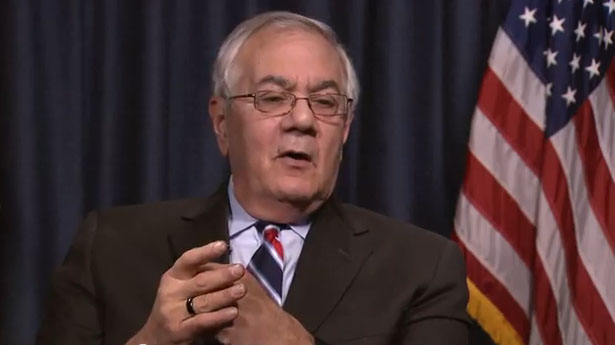 Barney Frank is a Democrat who served as a member of the U.S. House of Representatives fromMassachusetts from 1981 to 2013. In 1987 he came out as gay, and to the great credit of the majority of the public this had little impact on his electoral prospects, and so he was returned to office again and again as the most prominent gay politician in the United States until his retirement in 2013. In July 2012, he married his long-time partner, James Ready, becoming the first member of Congress to marry someone of the same-sex while in office. But he still had a big secret What secret could an openly gay politician possibly have? What he kept secret for most of the time that he was in office was his lack of a belief in a god, and only revealed it recently during an interview with Bill Maher …
Barney Frank is a Democrat who served as a member of the U.S. House of Representatives fromMassachusetts from 1981 to 2013. In 1987 he came out as gay, and to the great credit of the majority of the public this had little impact on his electoral prospects, and so he was returned to office again and again as the most prominent gay politician in the United States until his retirement in 2013. In July 2012, he married his long-time partner, James Ready, becoming the first member of Congress to marry someone of the same-sex while in office. But he still had a big secret What secret could an openly gay politician possibly have? What he kept secret for most of the time that he was in office was his lack of a belief in a god, and only revealed it recently during an interview with Bill Maher …
Barney Frank made a recent appearance on the Real Time with Bill Maher to talk about his life after Congress. When Maher joked, “You could come on this show, and sit next to a pot-smoking atheist, and it wouldn’t bother you…”, without missing a beat, Frank gestured between himself and Maher and asked, “Which pot-smoking atheist were you talking about?” The audience applauded, and Frank continued to express his regret that he could not go on to “have my husband Jim hold the Constitution, not the Bible, and affirm, not swear, that I was gonna be a wonderful Senator.”
While Frank is perhaps not the most surprising person to come out as atheist, the timing is certainly strange. After the chuckles subsided from Frank’s humorous way of disclosing his nontheism, a big question on nontheists’ minds was, “But why did it take so long?” And more specifically, “Why did Frank choose to disclose his atheism after his time in public office?”
In fact, here is that moment …
CS: You became the first openly gay member of Congress in 1987, but you didn’t reveal your nontheism until after you left office. Why? BF: It was never relevant. I never professed any theology. And it’s complicated by my Jewishness. Obviously, being Jewish is both an ethnicity and a religion. I was concerned that if I were to explicitly disavow any religiosity, it could get distorted into an effort to distance myself from being Jewish—and I thought that was wrong, given that there is anti-Jewish prejudice. For years I would go to temple, but I suddenly realized it doesn’t mean anything to me. So I decided, I’m not going to do this. I’m not going to pretend. During my service I never pretended to be a theist. It just never became relevant that I wasn’t, and I guess I was not as conscious of the discrimination nontheists felt. But I’ve always been opposed to any imposition of religion. I fought hard, for example, with other members of Congress to oppose any notion that a religious group getting federal funds could discriminate in hiring. When I took the oath of office, I never swore and said, “So help me God.” But members of the House take the oath en masse, so nobody noticed. I’ve said that if I’d been appointed to the Senate, as I wanted my governor to do but he decided he had other plans, I would’ve had my husband hold the Constitution. The subject just never came up. The only religious services I’ve attended for the last 20 years were funerals; I’ve attended more masses than a lot of my Catholic friends.
Now that in many ways does nail it. Politics needs to be 100% neutral when it comes to beliefs and be neither for nor against. Serving in political office is not about utilising it as a platform to promote a specific personal belief, but rather should be a place to honour all convictions, and give preference to none. He got that balance right, but the Republican party gets it very wrong This of course is also where modern Republicanism has gone terribly wrong. Having permitted itself to be infested with the idea that belief can be utilised to manipulate the public and win support, this same belief is morphing them into a party that is promoting a theocracy instead of a democracy, and that is a stance that must be abandoned if they wish to avoid the inevitable decline and demise it will bring due to the wholesale rejection of the extreme religious views that they are manifesting. It all perhaps has its roots back to 1979 when Paul Weyrich coined the term “Moral Majority.” His goal was to politicize members of fundamentalist, Pentecostal and charismatic churches – a constituency that had been basically apolitical. It worked, because many of them are now deeply in bed with the New Right Republicanism, and not just as supporters, but and the driving force.
“This Republican Party of Lincoln has become a party of theocracy.” – U.S. Representative Christopher Shays, R-CT, (New York Times 3/23/05)